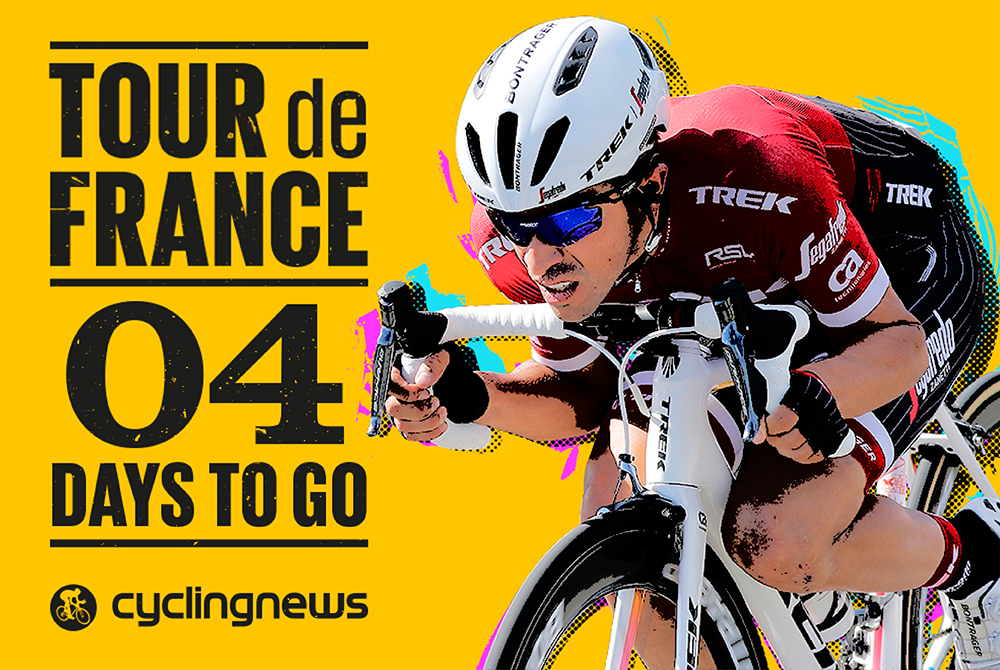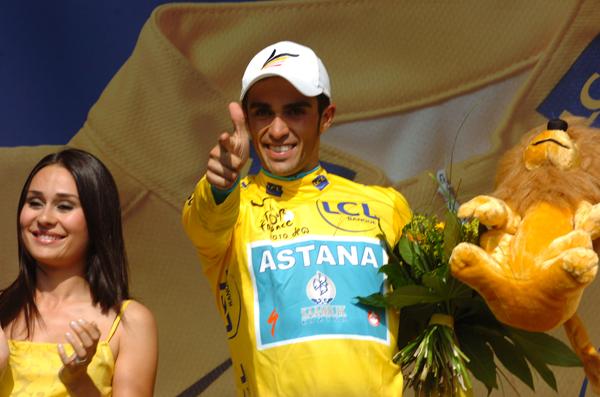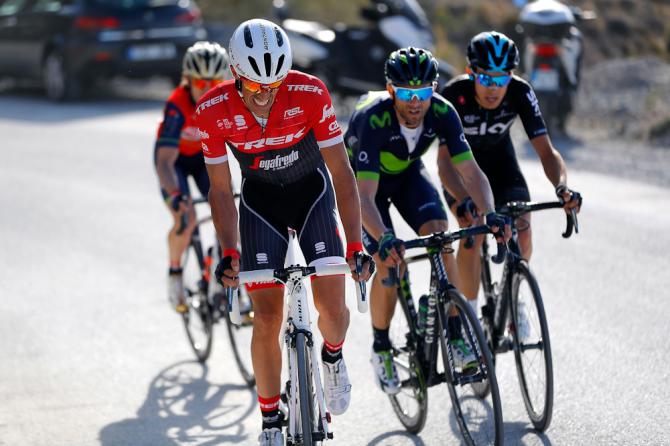Tour de France: Alberto Contador's last roll of the dice
‘I want people to remember that I fought until the end’

There was a point in time when Alberto Contador was almost unbeatable. He would toy with the opposition without a hint of mercy before unleashing attacks so devastating that even the race vehicles would struggle to keep pace. Whether it was at Verbier in 2009, on the Angliru a year earlier, or on the upper slopes of Etna in 2011, Contador was an unstoppable force. Between the summer of 2007 and the spring of 2011 he won every Grand Tour he started, with only his positive test for Clenbuterol and the final intervention of the Court of Arbitration for Sport scrubbing away two of those titles.
Dauphine: Contador unfazed by missing top 10
Gallery: Alberto Contador's Trek Emonda SLR Team Issue
Tour de France 2017: The essential preview
Tour de France 2017: 10 riders to watch - Video
Trek-Segafredo team to support Contador and Degenkolb at the Tour de France
Meintjes, Swift and Ulissi give UAE Emirates multiple options at Tour de France
Dan Martin, Kittel and Gilbert lead Quick-Step Floors at Tour de France
A lot has changed at the Tour de France since those halcyon days for Spanish cycling and Contador fans in general. Team Sky have parked up on the lawn with their bus of marginal gains, a home nation has rediscovered its love for the Tour through Pinot and Bardet, and several rivals from the Schlecks and Evans to Armstrong and Nibali have come and gone. Yet through it all Alberto Contador has endured. He may not be the force he once was, and his style of racing may have modified but the old dog still has a few new tricks up his sleeve as he embarks on what is likely to be his final Tour de France challenge.
And if Alberto Contador is going to win another Tour de France then this is surely his final opportunity. The defending champion, Chris Froome, is more vulnerable than ever. His heir apparent, Richie Porte, still has question marks over his credentials and the diminutive Nairo Quintana failed to impress at the Giro d'Italia. The 2017 Tour is wide open.
"I feel optimistic. I've worked differently and I've been more relaxed. The training has gone well, and the numbers have been good," he offers up with a relaxed smile, arms neatly folded in front of a pit of voice recorders and iPhones.
With the limelight firmly on Richie Porte and Chris Froome this year, Contador finds himself on the next rung of Tour contenders. It's a fair status for the 34-year-old. After all, it's eight years since his Tour pinnacle in 2009 when he won the race despite factions within his own Astana squad conspiring against him. Since then, including the positive test of 2010, Contador has slowly slipped down the pecking order. There have been reminders of his pedigree, of course, such as the 2014 Vuelta a España and the Giro d'Italia of 2015 but at the Tour de France – the greatest show on the earth – Contador's best performance in recent years was fourth in 2013.
"In 2011 I went to the Tour at the last moment because it was important for Saxo Bank even though the Giro was in my programme. I arrived at the Tour and had a crash and lost a minute on the first day. The next day we lost 40 seconds in the TTT and after two days I was two minutes off my rivals. Then I had a big crash and hurt my knee. On the Galibier I lost the Tour but the next day I had a beautiful attack on Alpe d'Huez," he says, reeling off his roll of honour, and without stating it, reminding everyone that he still considers himself the 2010 champion.
"In 2013 I changed my area of training. I went to Lugano and maybe it was a hard year for me. I couldn't train that well in the winter and I paid for that during the season.
Get The Leadout Newsletter
The latest race content, interviews, features, reviews and expert buying guides, direct to your inbox!
"In 2014 I think it went perfect and the feelings were good at the start. Then on stage 10 I had a really bad crash but it was impossible with a fracture in my leg. In 2015 it was after the Giro and I didn't recover well. I was tired at the start. Last year I felt good but of course with the two crashes I lost my options."

Managing decline or peaking perfectly?
The consensus within the Trek-Segafredo team is that Contador is still capable of competing for Tour honours but that his ageing legs and the emergence of fresh talent has led to the revaluation in terms of both an approach to training and racing.
At the Dauphiné Contador was ordered to ride within his limits and, rather than race his rivals, he was forced to tick through the gears before reaching his threshold and ultimately backing off. It may have nullified his potency, and perhaps diminished his Tour odds, but the thinking inside Trek-Segafredo is that the Spaniard will arrive in Dusseldorf fresh and ready to race – a status he has not entertained since 2014.
"I feel very good and with more confidence than last year. Last year before the Dauphiné I worked very hard and when I arrived here I won the first time trial but I remember that I finished the race very tired. This year I've gone easier on the climbs, I'm fresh and will finish with good legs. The watts are perfect. It's better than last year."
Another aspect that Contador has on his side during this campaign is his team. Over the last five years the rider from Pinto has looked longingly over at Team Sky, where Froome has been able to assemble a squad of heavy hitters and huge salaries that can ride at 6 watts per-kilo on the climbs and control the racing.
For all the romance that cycling was built on, and all the enchantment that probably brought fans into the sport, the reality is that the professional arena is decided by numbers. If you can pay the best, you'll get the best, and while Froome, Quintana and Porte have enjoyed varying degrees of stability, Contador has had to endure some truly shoddy team camper vans. From the infighting with Lance Armstrong at Astana over leadership to the the turbulent phase riding at the whim of Oleg Tinkov, Contador has had his fair share of Grand Tour battles riding with one hand tied behind his back.
"During all these years I've had many different teams. Sometimes they've been really strong and in other years they've been… less strong," he says diplomatically and is met with a ripple of laughter.
"In some years the teams have been really motivated and worked in the same direction and in some years they've been strong but not worked together. This year we have a strong team and everyone is very motivated. That's crucial at the race. The level will be higher."

Alongside Contador will be the talented Jarlinson Pantano, who made the switch from IAM Cycling over the winter, and who appears to thrive riding for a racer he aspires to emulate, while Fabio Felline and Bauke Mollema make up the rest of the climbing contingent, John Degenkolb has been afforded Koen de Kort for the sprints, with Markel Irizar, Andrea Cardosa and Michael Gogl give a sense of versatility. It's not the strongest team heading towards this year's Tour but Contador has certainly won Grand Tours with weaker units around him.
And winning remains the only objective Contador is considering. It's an all-or-nothing attitude that has defined the latter years of his career. Whereas performances like Verbier once defined him, Contador has taken to long-range attacks to secure success, like Alpe d'Huez in 2001, Fuente de in the 2012 Vuelta, and this year's final stage in Paris-Nice.
"Of course I want to win it but I want to win when I go to the Giro or the Vuelta. The motivation is always the same. Of course my last Tour win was a few years ago, that's not the reason I want to win now, but I still think I can win this year. If I didn't think I could win, or if I thought that second place was my best outcome then I wouldn't go. The rivals are strong, they have strong teams but my numbers are there and I think we have some strong options on this team too," he says.
"For me it's the most important race in the world. That's first. Also, when I go to a race with one objective, it's victory. Okay, that wasn't the case at the Dauphiné but that's the only race. I love the competition at the Tour, and that everyone has the objective to win. That gives me motivation."
Why keep on racing?
The question is asked of why, at the age of 34, Contador is still plugging away and searching for a third Tour de France title. So many of his rivals from the late 2000s and early 2010s have hung up their wheels and moved onto new lives away from the pressures of professional cycling. Now, when Contador sits down for dinner at races only the withered, wind-battered lines on Haimar Zubeldia's face remind him that he still has some time on his side.
"Being one of the oldest Tour winners… that's more motivation for me. I don't like it but hey. Sometimes when we're at the dinner table and we start talking about some of the history and the names, and some of my teammates haven't heard of them, then I realise I'm maybe getting on a bit. But I'll be here until I'm 35 or 36, I don't know. But what I do know is that I have the rest of my life to enjoy the small things."
It's almost the end, both for this interview and Contador's career. The latest news is that he will re-sign with Trek-Segafredo for 2018 and take a final swipe at the Giro d'Italia in May. Whether he does the Tour de France next year is unclear but it's unlikely that he will head towards the summer of 2018 with serious hope of winning.
It's too early to think about what third Tour win would do for Contador's place in the sport but the Spanish climber has at least begun to think about his legacy.
"I want people to remember that I did things differently," he says.
"I want people to remember that I attacked from a long way out, and that I fought until the end to try and win. I want people to remember me for these things. It's not easy to look at racing now and see these things because racing is always under control with strong teams. If people can look back, go to YouTube, and see some of the attacks I made from 100km from the finish, that's what I want to be remembered for."
Contador has one more roll of the dice to improve that legacy.
Daniel Benson was the Editor in Chief at Cyclingnews.com between 2008 and 2022. Based in the UK, he joined the Cyclingnews team in 2008 as the site's first UK-based Managing Editor. In that time, he reported on over a dozen editions of the Tour de France, several World Championships, the Tour Down Under, Spring Classics, and the London 2012 Olympic Games. With the help of the excellent editorial team, he ran the coverage on Cyclingnews and has interviewed leading figures in the sport including UCI Presidents and Tour de France winners.
